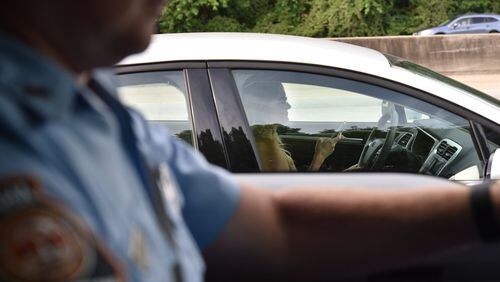Larry Benator of Johns Creek used to hold his phone while talking and driving. He saw plenty of people around him doing the same thing or, worse, with their heads down, texting behind the wheel.
Benator stopped because he noticed he wasn't paying much attention to the road — and because Georgia's new distracted driving law prohibits motorists from holding their phones. Now he uses hands-free Bluetooth technology in the car. And he's noticed a lot fewer drivers fiddling with their phones.
“I think the law is law,” he said. “You shouldn’t hold the phone at all.”
Benator isn't the only motorist to get the message about the Hands-Free Georgia Act, which took effect last summer. An Atlanta Journal-Constitution survey of Georgia residents found the vast majority say they usually obey the law.
Though only 45 percent of respondents said they obeyed the law all the time, an additional 40 percent said they did most of the time.
The survey, conducted Jan. 7 through Thursday by the University of Georgia’s School of Public and International Affairs, involved 702 registered voters and has a margin of error of 3.7 percentage points.
The results suggest there are still plenty of drivers with their hands on their phones, at least sometimes. But the law’s chief sponsor is pleased with what he’s seen so far.
"What law enforcement says is, it's going to take time," said state Rep. John Carson, R-Marietta. "It's going to take a culture change. It's going to take enforcement."
The Hands-Free Georgia Act was a response to a rising toll of death on Georgia highways. Traffic fatalities rose by one-third from 2014 to 2016 before leveling off in 2017, when 1,549 people died.
Safety experts say distracted driving played a big role — especially our romance with cellphones. No longer limited to voice communication, they’ve become palm-size computers that let us text, chat, socialize, listen to music and watch movies. And they’re distracting us to death.
Previously, drivers could hold their phones while talking, but it was illegal to text and drive in Georgia. Teen drivers couldn’t use electronic devices at all.
But police said the old law was difficult to enforce — they often couldn't tell whether someone was texting or talking while holding their phone. Now the law is simpler: With a few exceptions, if you're holding the phone, you're breaking the law (you can learn more about what's allowed and what's not under the new law here).
With the families of those who had lost loved ones to distracted driving as his best lobbyists, Carson won overwhelming support for his bill in the General Assembly. The new law took effect July 1.
And while the Georgia State Patrol initially emphasized warnings, it cracked down late in the year. The patrol issued 8,389 citations for cellphone-related offenses in the second half of 2018, compared with just 3,827 for similar offenses in the first half. Citations cost $50.
Preliminary figures show traffic fatalities were down 7 percent last year.
Not everyone is sold on the new law. About 8.5 percent of survey respondents said they seldom obey the law. An additional 4.3 percent said they never obeyed it.
Dan Guerrero of Atlanta got a citation for violating the law back in November. But he said he’s not changing his behavior, except perhaps to hide it more.
He called the law “an unnecessary government moneymaking scheme.” And he doesn’t believe holding a phone while driving is dangerous.
“I’m putting myself in just as much danger by just being bored to tears in my commute every day,” Guerrero said. “You can’t tell me I’m any more dangerous of a driver by keeping myself engaged in something, like emails.”
Still, many people welcome the hands-free law. Deirdre Lawson of Lithonia learned to use Bluetooth technology when it took effect. She’d like to see it enforced more often.
“It puts into perspective what’s really important,” Lawson said. “I can hear the phone, and I’m like, ‘Do I really want to answer that?’ I had to train myself, OK, I can’t pick up the phone.”
Even as Georgians get accustomed to the new law, it may be changing. In the name of simplifying the law, the old ban on teens using electronic devices went away under the Hands-Free Georgia Act. But Carson said he may seek to reimpose the ban out of concern for the safety of teen drivers and others.
Still, Carson said he’s pleased with the implementation of the hands-free law to date. And he hopes more people will obey it as time passes.
“I constantly see people out there still holding their phones,” he said. “It’s very frustrating.”
Stay on top of what's happening in Georgia government and politics at ajc.com/news/georgia-government/.








